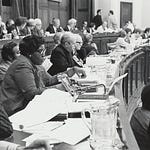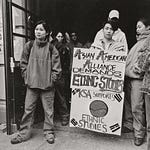
After he wrote an article about conspiracism in both political parties on December 14, 2022, I asked my friend Ryan Girdusky to come on the show to discuss why conspiracy theories have infected our electoral system. A conservative media and messaging expert, Ryan has worked as a journalist, a campaign consultant, a Super PAC organizer, and a television pundit. He’s also the author, with Harlan Hill, of They’re Not Listening: How The Elites Created the National Populist Revolution (Bombardier Books, 2020).
As importantly, Ryan has friendships as diverse as Marjorie Taylor Greene, Ann Coulter, and, well, me. Ryan and I disagree about many things regarding the national political agenda, as you will learn if you peruse his Substack, The National Populist Newsletter. And yet, I always find our dialogue useful—mainly since it helps me listen more carefully to a broad range of political voices that today’s media environment makes easy to ignore.
Program notes:
Read a profile of Marjorie Taylor Greene by The Atlantic’s Elaina Plott Calabro here, and watch Greene’s February 4, 2021, speech on YouTube.
As Ryan points out, polling shows that trust in institutions hit an all-time low in 2022: see Jeffrey M. Jones, “Confidence in U.S. Institutions Down; Average at New Low,” Gallup.com, July 5, 2022.
Ryan mentions Charles Murray’s theory of “the great sort:” this idea comes from Murray’s book, Coming Apart: The State of White America, 1960-2010 (Crown Forum, 2013).
The account of the 2016 Hillary Clinton campaign that Ryan namechecks is Jonathan Allen and Amie Parnes, Shattered: Inside Hillary Clinton's Doomed Campaign (Crown, 2017).
Hillary Clinton accused Tulsi Gabbard and Jill Stein of being Russian assets in October 2019 on David Plouffe’s podcast “Campaign HQ.” They both deny it.
As Ryan says, on January 31, 2019, Rachel Maddow imagined Russian President Vladimir Putin attacking the power grid in the Dakotas during subzero winter temperatures.
Ryan mentions Arizona Republican gubernatorial candidate Kari Lake’s attempt to overturn her election loss: on December 9, 2022, she filed a series of lawsuits, two of which were eventually heard in court. Lake failed to overturn the election.
Claire and Ryan had an exchange about why George Soros is targeted by the right: Soros was most recently accused by Fox News of giving $131 million to liberal media outlets between 2016 and 2020. According to CNBC, Soros’s nonprofit gave $140 million “to advocacy organizations” in 2021 alone, on top of personal donations of $171 million.
Discussing Americans’ retreat from their communities, Ryan cites a landmark sociology study, Robert Putnam’s Bowling Alone: The Collapse and Revival of American Community (Simon and Schuster, 2000.) You can read about the book, and access the data it is based on, here.
Republican conservatives based much of their post-war political strategies on community building. Before Claire interviewed Ryan, she had just finished a podcast recording with historian Robin Morris about her book, Goldwater Girls to Reagan Women: Gender, Georgia, and the Growth of the New Right (University of Georgia Press, 2022). You can listen to that episode of “Why Now?” here.
Ryan refers to policy decisions towards China in the George H. W. Bush and Bill Clinton administrations that cost American jobs. Listeners who want to learn more might want to read Ramon H. and Michel C. Oksenberg, Eds., Making China Policy: Lessons from the Bush and Clinton Administrations (Rowman & Littlefield, 2001).
Are you puzzled about why Ryan believes George W. Bush is the worst American president? Then, you may wish to read Doug Bandow’s “Righteous Anger: The Conservative Case Against George W. Bush,” The Cato Institute, December 11, 2003.
You can listen to Rudy Giuliani’s accusations of election fraud delivered at Four Seasons Total Landscaping on November 7, 2020, here. There was no systematic voter fraud in Pennsylvania during the 2020 election: investigators for the Associated Press found only 26 cases of illegal voting in Pennsylvania among less than 500 nationwide.
Answering Claire’s question about antisemitic conspiracy theories, Ryan mentions accusations against the minister and MSNBC political Al Sharpton based on his time as an organizer in New York City. The riot Ryan refers to was in Crown Heights on August 20, 1991. It was triggered by the accidental death of a Black child, Gavin Cato, and accusations that he died because a Jewish community ambulance had failed to treat him. In addition, Yankel Rosenbaum was stabbed to death by a protester in three days of violence amid accusations that he was targeted because he was Jewish. Sharpton used the phrase “diamond merchants” in a speech and later apologized for inflaming the protests. While Sharpton played a prominent role in those three days of violence, it was Jesse Jackson who used the phrase “Hymietown” to characterize New York City. Jackson apologized for this during his 1984 presidential campaign.
You can download this podcast here or subscribe for free on Apple iTunes, Spotify, Google Podcasts, or Soundcloud. Do you use another service? Let me know in the comments, and I will submit it to them! And if you liked this podcast, please:















Share this post